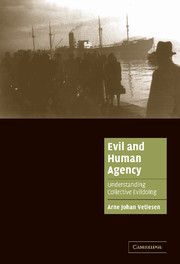Book contents
- Frontmatter
- Contents
- Preface
- A note on the cover image
- Introduction
- 1 The ordinariness of modern evildoers: a critique of Zygmunt Bauman's Modernity and the Holocaust
- 2 Hannah Arendt on conscience and the ‘banality’ of evil
- 3 The psycho-logic of wanting to hurt others: An assessment of C. Fred Alford's work on evil
- 4 The logic and practice of collective evil: ‘ethnic cleansing’ in Bosnia
- 5 Responses to collective evil
- 6 A political postscript: globalization and the discontents of the self
- References
- Index
- Evil and human agency
Preface
Published online by Cambridge University Press: 10 December 2009
- Frontmatter
- Contents
- Preface
- A note on the cover image
- Introduction
- 1 The ordinariness of modern evildoers: a critique of Zygmunt Bauman's Modernity and the Holocaust
- 2 Hannah Arendt on conscience and the ‘banality’ of evil
- 3 The psycho-logic of wanting to hurt others: An assessment of C. Fred Alford's work on evil
- 4 The logic and practice of collective evil: ‘ethnic cleansing’ in Bosnia
- 5 Responses to collective evil
- 6 A political postscript: globalization and the discontents of the self
- References
- Index
- Evil and human agency
Summary
My obsession with this book's subject goes way back in time. I remember my shock when coming across, at the age of fifteen, the autobiography of one of the handful of Jews from Norway who survived Auschwitz, Herman Sachnowitz. His book is titled It Concerns You Too.
Now a professor of philosophy specializing in ethics, my early interest in how organized evil comes about and what it does to all affected is, if anything, more intense than ever. Being a contemporary to the occurrence of genocide in the 1990s – in Bosnia and in Rwanda – made the topic even more urgent. Sixty years after the liberation of Auschwitz, we know only too well that the promise, nay imperative, ‘Never again!’ has been betrayed again and again.
During the years spent working on this book, I have benefited from exchange with a large number of friends and colleagues. For contributions big and small, I wish to thank Per Nortvedt, Jan-Olav Henriksen, Lars Svendsen, Henrik Syse, Carsten Bagge Laustsen, Tone Bringa, Odd Bjørn Fure, and Bernt Hagtvet. Alastair Hannay once again offered his unfailing moral support. Zygmunt Bauman once again demonstrated that genuine friendship can endure heated disagreement. Thomas Cushman showed his belief in the book at a decisive moment. To all of them, and to the students who have made my seminars on evil into a workshop of ideas from which my argument in this book slowly ripened, I wish to express my deep gratitude.
- Type
- Chapter
- Information
- Evil and Human AgencyUnderstanding Collective Evildoing, pp. xiPublisher: Cambridge University PressPrint publication year: 2005

